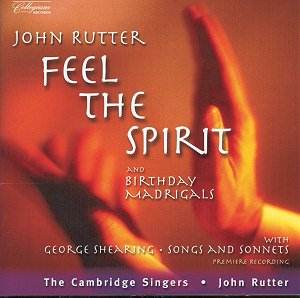I used to think that John Rutter was the Andrew
Lloyd Webber of modern church music. How utterly wrong I have been proved
to be!
The Second Viennese School, with those geniuses Schoenberg,
Berg and particularly Webern, turned their back on diatonic melody.
Such melody is usually confined to a scale of 7 notes and, while I am
not a mathematician, the permutations of these notes to form an original
diatonic melody today is non-existent when you calculate all the music
written from Plainsong to the modern day. Mozart wrote about 650 works,
Haydn about 2000. And what of Beethoven, Handel, Brahms, Schubert, Mendelssohn
et al. How many melodies did these great composers write between
them; not to mention the remainder of them?
This is one of the many reasons why pop music is so
awful. The melodies are not original. Take the Beatles... you are welcome
to them. I remember a great musician saying to us, "The only qualification
for being a pop singer is the inability to sing!" As a schoolteacher
I have to take an interest in what children like today and so I listen
and watch a lot of pop music. I have yet to find one pop star who can
sing in tune. There are plenty of bawlers, shouters, snarlers and those
who wobble around notes because they are not sure of it!
As to Gospel music I hate the clapping, jigging and
the endless singing of the same words over and over again and someone
talking over it in a semi-rap style. This is typical of Pentecostal,
Charismatic and House groups. It is so disorganised and indeterminate.
Utterly confusing and, if a Biblical verse can be used to support my
view, God is not the author of confusion. Modern day worship has degenerated
into 'anything goes' - a type of disorder.
But here John Rutter presents spirituals, which is
Gospel music, in a beautifully crafted and organised way. This is pure
music. One can hear the words. The progress of the music, which has
logic is clearly defined. There is no clapping and stomping of feet
… halleluia! … and no voice-over rap … Thank God!
The performance of Deep River is absolutely
choice. The tempo, the diction, the clarity, the simple but effective
harmonies, make it so moving that I have played this track to death.
Now this is a spiritual experience. And Margaret Marshall is
superb. I adored the men’s syncopated rhythm in The Battle of Jericho
but the class act is Every time I feel the Spirit, which
also includes another spiritual within it. Note the contrasts and the
sheer joy ... and not the clapping!! The climax is staggering. I have
played this track to death as well.
George Shearing is a magnificent jazz pianist but I
am undecided about his Shakespeare settings. They are very pleasant
but somewhat bland. And the problem of originality again looms large.
One song sounds like the hymn tune Dix, namely As with gladness
men of old. Well might the producers say that these songs were deliberately
written in well used styles. If you are going to write in an already
existing style you have to introduce some striking originality. When
I wrote my symphony to commemorate the 250th anniversary of the death
of Haydn I had his style in mind as well as parts for saxophone, cornet
and tuba playing a duet with a piccolo.
John Rutter’s The Heavenly Aeroplane has an
absolutely absurd text which offends many Christians and I can understand
why. It is written in a rock n’ roll style and I was beginning to admire
Rutter.
Lord of the Dance has another absurd text and
is an attempt by the early precursors of Pentecostals to justify dance
in Christian worship.
The Birthday Sonnets fall into the same category
as Shearing’s songs. There are very pleasant but easy listening and
only easy listening. Nothing great here.
The disc ends with an arrangement of Hoagy Carmichael’s
Skylark which is very welcome.
An interesting disc and an important one to show that
the singing of spirituals and Gospel music can be far more enjoyable
when sung properly than in some ramshackle gospel choir clapping, clicking
their figures and being repetitive.
Well done, Mr Rutter
David Wright

![]() Margaret Marshall (mezzo)
Wayne Marshall (piano)
Margaret Marshall (mezzo)
Wayne Marshall (piano)![]() COLLEGIUM RECORDS COLCD
128 [74.55]
COLLEGIUM RECORDS COLCD
128 [74.55]